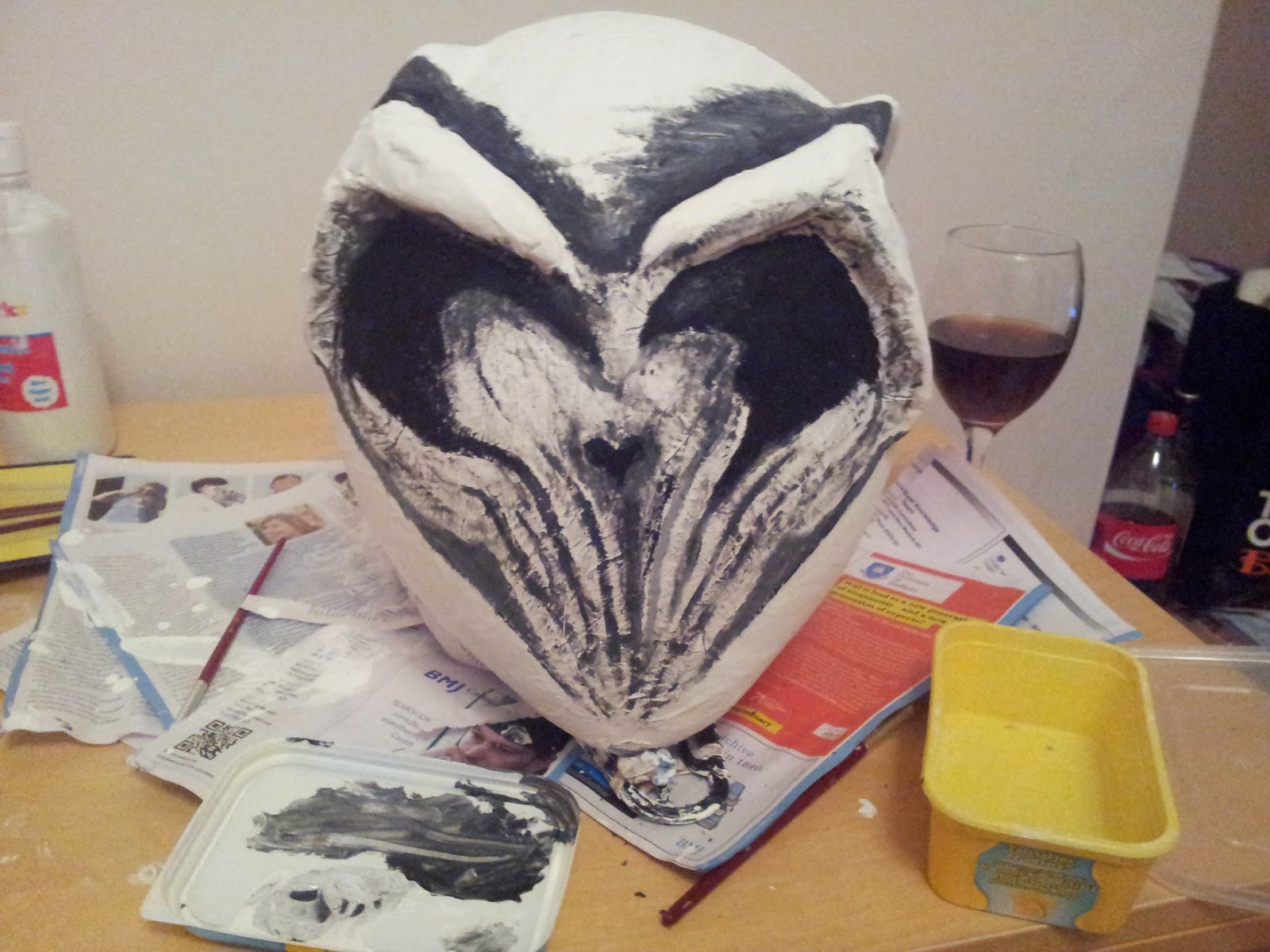"Why am I still here __ hours overtime?"
"Where is my life?"
"Medicine is not a job. It is a way of living - a profession."
Swallows you up.
So I've finished the first 4 months (first job) of being a doctor/intern and despite being quite confident with my skills/abilities/professionalism, I can vouch that I've cried more times in this short period than I have my whole life, and I rarely cry - I'm tough, I've always been a happy bunny, I don't cry! Yes, I know, everyone says it's a steep learning curve, blah blah blah, it get's better with experience, etc. But it's not
simply the learning curve that's been knocking me off the happy swing, but just the general...
toll. So I've often questioned, is this really worth it? I like to be the optimistic visionary, but realistically, I don't think it's really going to get any better as a hospital physician... unless I become a GP or GUM clinician or Public Health doctor?
The high responsibility of being a doctor
in the hospital and the long physical/emotional arduous days will not change. You can't just finish at your designated time - a patient can deteriorate very quickly e.g. if septic...or majorly bleeding! You make simple easy human errors which may end up harmful to the patient. I've only made one simple (prescribing) mistake because I was just so tired, dehydrated and stressed during an understaffed, tremendously sick and distressed patients, weekend medical ward 12-13 hour cover (I hadn't eaten or went for a wee at all!) - thankfully no harm was caused. It is very difficult to have a life when you come home, absolutely
knackered emotionally/mentally/physically, dehydrated, actually go to the toilet, eat whatever is lying around, shower and sleep... and try to
sneak in Eportfolio/work in...revision/learning? A long-term problem emerges of insomnia - so much adrenaline from your day continue to pumps, underlying unrecognised anxiety buzzes... you can't sleep despite you need sleep leading to a vicious cycle.
I tip my hats off to all the doctors of equal and senior rank to being such solid characters to survive being a doctor.
Shifts that are 12 hours (usually more in reality!) and nights on-calls are painful, because we don't have our protected lunch or loo breaks that you can end up having lunch at 6.30pm instead of 12pm, and you've not been to the toilet ALL DAY! Where are our protected breaks as per other members of staff (nurses, ward clerks, health care assistants)?
Labs: if only they make it clear on the Trusts Intranet what are the requirements of certain tests (amount, whether it needs to go in separate tubes, number of tubes, timings, temperatures, etc.). Also if you decide to REJECT an (important) sample, please state a reason. I don't enjoy re-stabbing patients saying 'sharp scratch' for something that was preventable.
I have interviewed prospective medical students for 2 years, and I train prospective medical students for their medical school interviews. I have to say, as a high school student, no matter how much work experience you do, you have no idea what's involved in university... never mind the actual job/pressure. People talk about the pressure and unglamourous side, but highlight the whole glamourous side of the 'rewarding' career. All the 'negatives' about the career, you can't comprehend... and your ears listen to the glistening over the negatives. There was the 16/17-year old me who wasn't fazed by any challenge,
neither had I found anything a challenge, thus thinking medicine could be a
walk in the park. Invincible thinking of a youth.
Then you enter university, go to placements - nil responsibility, observe, skive placement/lectures, go have lunch with friends, go to the pub/union and dance/drink your hearts away. I was rarely stressed in university, always enjoying myself and placements. Exams are hard - not to be understated. They can nibble at your soul. But nah, the 'responsibility'/'burden' during placements was completely overlooked to me as a student. Thought medicine was interesting... thought it could be something I could do for life.
Now Doctor/Intern in the NHS. First of all, I applied specifically for a hospital due to a specific specialty that I may want to specialise in (despite not being a favoured hospital of mine at all) - "Woo", got my first choice out of the 500 odd jobs ranked... I was ecstatic, excited... then very last minute prior to starting my post, they changed my job to something that was my weakest, disliked, disinterested job. Last minute job changes happens a lot by the way. Thought fate was meant to be, and so I have soldiered on and tried to get the most out of it but it still remains frankly unrewarding and uninspiring and frustrating. I think I'm more frustrated about the uninspired-ness. I've learned hardly anything but how to be a secretary.
I've never had so much frustration, anger or sadness in my life ever. This specialty also is one of those chronic ones where we're prolonging the lives of patients (no cure), who often get re-admitted for same recurring things... then dies. Also it is disheartening when no matter how much effort you pour into helping someone, patients/relatives and colleagues can have such a high level of dissatisfaction. Also when you lose continuation of follow-up, there's also no rewarding feeling. Again, this is from the words of a first-year doctor.
Certain colleagues too can nibble right at you and be dissatisfied and
judging by the smallest of things...or expect you to get them everything that's a hand-reach away. One thing that bugs me (a lot) is the hierachy. Junior doctors are not slaves and secretaries. We've been trained to be doctors : we're not around to be full-time phlebotomists or secretaries...(or scapegoat), we are there to treat and help patients, examine and practice medicine. We're not there to file your mess or run around chasing/looking for things whilst you stand there in your arrogance. Just because we are junior and new (thus expected and accepted to make some mistakes) does not mean that we can be your
scapegoats when things go wrong! It's disheartening when you do things right but get wrongly accused; have staff (especially
those up the ladder) unfairly point fingers at you; and have staff shove
off their wrongdoings or angry patients/relatives unto you to deal with and solve!
"You're a junior doctor, everything you're going through we all had to go through that before. It's all apart the process," is a poor 'traditional' attitude to have - that assumption and application of that needs to stop and change. It is just an unhealthy cycle. The stark hierarchy will never make the NHS/workplace 'more open or transparent' that the NHS has apparently tried to make it. Because of this stereotype, it makes it hard for junior doctors to complain/raise their concern about their treatment where 'I can't complain because it'd make me look weak/less professional'.
Colleagues - every work place has good and bad colleagues. Unfortunately, when trying to look after sick patients, efficiency requires a process of speed. I have had colleagues who are slow and/or chitchat-diddledaddle that I have had to rev up double mode to cover/correct for them. If a colleague's weakness is speed, that's fine as long as they have patients' best interests and is considerate/thoughtful (which are very important qualities to me!), but when one is too relaxed and slow during understaffed/urgent times... it makes it difficult - patients health can be compromised. I appreciate 'chilled' people as it'd make me feel more cruisey, so it's fantastic when there's chilled-efficiency but horrendous when there's chilled-inefficiency/laziness. Also, if you attend to more patients, more of the responsibility of the ward falls onto you. If things go wrong - it's you. The (chief) Sister even thought I was a CT1/CT2 after 3.75 months of working with her (I'm just a Foundation House Officer Year 1... a 3.75-month old doctor!), just because I seem to have 'everything under control' or 'control of everything'! (I'm just going to have to take that as a compliment.)
The legalities. The amount of forms, documentation, extra bits of paper... extra steps and time to make sure someone can't sue us... or to NOT be
scapegoat. Absolute pain.
Often patients and the relatives just don't quite understand that we have to look after an overwhelming amount of patients. NHS is free for all, but they do not staff us adequately especially during the weekends. There are limited resources/money. We can't offer you a 5* hotel service. The hospital is not a hotel, mind. Yes, we try to maintain your dignity and respect, and be nice out of our 'medical clinical care' - give you tea, find another blanket for you, make you comfortable - but if you're medically stable, we are naturally going to be designating more of our time and attention to the super sick. When/if you're super sick, we'd direct our attentions to you. I do not enjoy having to stick a needle in people's arms to take bloods or cannulate... and fail. I understand the hospital and to be a patient is a scary situation - but I too have the fears. I try my best at everything and I have your best interest. I give all of my patients excellent care, but there's only so much brain, energy and muscle in my body that I can give out... and patience.
Death - you learn to disengage yourself. First declaration/cremation/verification of death - disengaged. Doctors do cry too. One day where I was working 5 hours over time, a dear patient died that night, I could not afford to stop working to cry, so instead I put my head down hiding my tears at the nurses station working away... dealing with other sick patients.
When you're in distress/in pain, upset, bereaving, afraid - I'm distressed.
The basic pay for a FY1 doctor is about £22,636 a year. You just don't have time to spend it. Money goes out to tax, pensions, petrol (£50/week), to the gym where you have no time/energy to go to, and food/alcohol to just drown in. Doctors either have no time to eat or forget to eat and lose weight, or are too tired to cook and eat absolute junk quick food/emotionally eat and gain weight - the former applies to my best friend, the latter applies to me. It is funny how both my best friend and I were the happiest, such care-free, satisfied people pre-doctoring, and now dissatisfied.
When you're unhappy, you have to change things to make yourself happy right? Can quitting be an option that's considered correct, brave or cowardly?
Why do a job where you work your utter ass off and put so much soul into it - but you don't enjoy or feel inspired or feel any reward? I tell myself to keep fighting - these challenges ought to have a happy ending/reaping rewards, right? I don't know that many happy doctors to be honest. It's a long forever-life-learning profession... endless exams, endless court cases. 10 years AFTER medical school until you're settled. If I don't escape after FY2 and go do something I love or travel... I fear I might suffocate. You only live once, and being a doctor absolutely swallows it up, and so
I promise myself to not get sucked in.
This doesn't make me a bad doctor. I always want the best for my patients - I want them happy, I want myself to be happy. But when you get to the point where you're exhausted out of your wits... it just becomes unbearable, unacceptable. If I actually voiced this out to my family, colleagues, friends, best friend... they'd be surprised. I hide all this sadness and frustration under my smiling, bouncy outward appearance and smile. Everyone knows and says I am 'tough', 'efficient', 'a soldier'...even can be imagined as a female surgeon. (Never!)
Sorry for such a depressing entry. Some things mentionned may be seen as petty, but all added up is a mound. I could list so much more. There are some upsides - some humorous colleagues or patients, being given a thank you card and chocolates to fuel your overtime hours, staff christmas parties, consultants/registrars dancing and tipsy, maybe some eyecandy if lucky. May this be an insight for patients/relatives. May this be a reminder to other doctors in the world, you're definitely >50% not alone if you're second-thinking your choice of career.
Am I headed for a burnout? Maybe but only if I am not able to find measures to apply the principles of Beneficence, Negligence, Autonomy to my soul that doctors apply to patients.













































